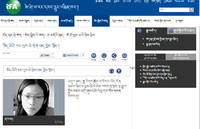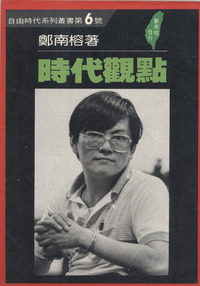2009年03月17日
達賴喇嘛與一個人對圖博的摰愛
今天是愛爾蘭的聖派翠克節,也是達賴喇嘛五十年前逃出羅布林卡的日子,也是羅丹朗傑先生的生日。
「朗傑先生認為自己的生日是個倒楣的日子,因為在同一天,他的國家深受愛戴的領袖被逼逃往印度,...而每年的三月十七日都重燃他對於爭取圖博自由的熱情。」

在尼泊爾抛灑青稞粉的藏人。
「朗傑先生認為自己的生日是個倒楣的日子,因為在同一天,他的國家深受愛戴的領袖被逼逃往印度,...而每年的三月十七日都重燃他對於爭取圖博自由的熱情。」

在尼泊爾抛灑青稞粉的藏人。
BOSTON GLOBE
Opinion Editorial,
Dalai Lama and a man's passion for Tibet
By Lobsang Sangay
March 17, 2009
達賴喇嘛與一個人對圖博的摯愛
五十年前的今天,(三月十七日),尊者達賴喇嘛打扮成俗人的樣子,躲過了中國軍人監視,偷偷溜出拉薩的夏宮。在附近的一間房子裏,羅丹朗傑(Luting Namgyal )出生了。他的父母非但沒有慶祝他的生日,反而懷疑他們的兒子是否能在中國紅軍所帶來的暴力之下倖存。
今天,他是(美國麻塞諸塞州)麥德福鎮(Medford, Mass.)的居民,他正在倒數日子,等待達賴喇嘛五月二日來波士頓。
朗傑先生認為自己的生日是個倒楣的日子,因為在同一天,他的國家深受愛戴的領袖被逼逃往印度,還有八萬博彌(藏人)跟隨而去。自從1950年中國軍隊第一次入侵以來,博彌被迫生活在壓迫的政權之下,在他們的統治底下,數十萬的博彌被殺死,還有更多人被囚禁。
每一年,當他的生日來臨時,朗傑先生就想起他一度獨立的國家所經歷過的奮鬥。而每年的三月十七日都重燃他對於爭取圖博自由的熱情。
朗傑先生年輕的時候,在一家中國的大學裏讀書,然後在今日稱之為西藏自治區的政府裏工作。他以及他的妻子都有很好的收入,而且在拉薩過著中上階級的生活。然而在私底下,朗傑先生卻為圖博自由從事地下工作。他搜集政治犯、以及違反人權的各種資料,並且把這些資料想辦法送到外面的世界。冒著極大的危險,他也播放從外面走私到圖博內的流亡政治活動錄影帶。
在中國當局的雷達下,他以及他的朋友在公共的牆上貼大字報,並且在佛教神龕的石頭底下放置政治性的傳單,好讓博彌能夠傳閱。
然而這一切在1990年1月都嘎然終止了,中國警察逮捕了朗傑先生,並且把他關押了十天。他知道自己在拉薩已很難再待下去了,於是帶著妻子與四歲的女兒逃走了,他們在冬天走上1959年達賴喇嘛逃亡的同一路線,越過了喜馬拉雅山區,忍受著凍死的危險、來到了印度的達蘭薩拉,西藏流亡政府的所在地,因緣巧合中,抵達的日期就是三月十七日。雖然他逃出來了,卻陷入嚴重沮喪,甚至重病臥床,差點死掉。當他恢復健康後,他為西藏流亡政府工作。
透過美國的難民安置計畫,朗傑先生在1990年代早期移民到波士頓。十八年後,他的故鄉拉薩開始了2008年遍及全國的起義活動。今日,武裝的中國警察帶著自動步槍巡邏拉薩的街道,而狙擊手駐守屋頂上。不遠千里來拉薩朝聖的博彌,被禁止停留超過三天。僧人不能離開佛寺超過幾個小時,因此也不能為民眾舉行往生的佛事。在絕望的心情驅使之下,某些博彌只好開車到郊外的佛寺去,偷偷帶走僧人,讓他們穿上普通的衣服,進城來作法事。沒辦法這樣做的人,只好讓曾經在流亡學校非法受過教育回國、會唸一些基本經文的年輕人,來主持這些喪禮的儀式。如果被發現的話,這些僧人與喪家都會面臨嚴厲的處罰。
在目前這個沒有正式宣布、卻實際戒嚴的時期裏,朗傑先生很少打電話給他的家人與親戚,就算打的話,他們也害怕被中國當局竊聽而掛斷電話。
從今年春天開始,圖博各地都有標記被中國佔領五十週年的抗議活動,包括安多格爾登寺的僧人自焚了,數百名農民包圍了康區(四川)理塘的一家派出所。所有的抗議者都有一致的口號:讓尊者回到圖博,請不要再騷擾博彌了。隨著怨恨的加深,圖博可能會陷入一個將嚴重傷害雙方的深淵裏。
朗傑先生認為,雖然他的家人與他的同胞受到了這樣的痛苦,然而非暴力、透過對話而和解妥協,才是最佳的解決問題之道。他期待達賴喇嘛今年五月二日在波士頓的演講,並且祈禱達賴喇嘛在不遠的未來能夠返回自由的圖博。而他也希望他的生日將不會再標記達賴喇嘛離開圖博的日子,而是一個大家都等待良久,值得一起歡欣慶祝的良辰吉日。
洛桑森蓋博士是哈佛大學東亞法學研究的高級研究員。他目前正在負責籌備尊者達賴喇嘛前來波士頓的訪問 (www.bostontibet.org).
FIFTY YEARS ago today the Dalai Lama, dressed as a layman, slipped out of the Summer Palace in Lhasa, Tibet, escaping the gaze of Chinese soldiers. In a nearby house, Luting Namgyal was born. But instead of celebrating his birth, his parents wondered if their son would survive the violence wrought by Red Army of China.
Today, a resident of Medford, he's counting the days until he meets the Dalai Lama, who arrives in Boston May 2.
Namgyal regards himself as an unfortunate soul born on the day his nation's much-loved leader fled to India along with 80,000 other Tibetans. Since 1950, when the Chinese army first invaded, Tibetans have been forced to live under an oppressive regime during which tens of thousands of Tibetans have died and thousands more imprisoned.
Every year as his birthday arrives, Namgyal is reminded of the struggle of his once-independent nation. And every March 17 recharges his passion to fight for Tibet's freedom.
In his youth, Namgyal studied at a Chinese university and then worked in a government of what is now called the Tibetan Autonomous Region. He and his wife were paid well and led upper middle-class lives in Lhasa. Quietly, though, Namgyal worked in the underground struggle for Tibet's freedom. He gathered information on political prisoners and human rights violations, and smuggled it to the outside world. Under tremendous risk, he also showed videos, smuggled into Tibet, about exiles' political activities.
He and his friends posted political posters on public walls and placed political leaflets under stones at Buddhist shrines for Tibetans to read and distribute under the Chinese authority's radar.
Life came crashing down in January 1990 when the Chinese police arrested Namgyal and jailed him for 10 days. Seeing his doors closing, he, his wife, and their 4-year-old daughter fled through the Himalayan Mountains in severe winter on the same route the Dalai Lama took in 1959. Despite nearly freezing to death, as karma would have it, the family reached Dharamsala, India, Tibet's government-in-exile base, on March 17. Despite Namgyal's escape, he fell into a severe depression, was bed-ridden for weeks with illness and nearly died. When he recovered, he worked for the Tibetan Government in Exile.
Through the US Refugee Resettlement Project, Namgyal immigrated to Boston in the early 1990s. Eighteen years later, his hometown Lhasa started the spring 2008 nationwide uprising. Today, armed Chinese forces patrol city streets with automatic guns, and sharp shooters occupy rooftops. Tibetan pilgrims who trek to Lhasa are prohibited from staying more than three days. Monks are barred from leaving their monasteries for more than few hours, which bars them from performing funeral rituals. In desperation, some Tibetans drive to countryside monasteries and smuggle monks, dressed in street clothes, into the city to quietly oversee Buddhist rituals. Those who cannot afford, have Tibetan youths illegally educated in exile schools, and returned, and know rudimentary prayer, oversee the funeral rituals. If caught, the monks and the families face harsh treatment.
During this undeclared martial law period in Tibet, Namgyal rarely calls his family. When he does, they hang up for fear of eavesdropping by Chinese authorities.
Since last spring, there have been sporadic protests in Tibet marking the 50th anniversary of the occupation by China, including a self-immolation by a monk in Kirti Monastery in Amdo, and few hundred farmers surrounding the police station in Lithang, Kham. All the protests have universal slogan: Return His Holiness to Tibet and leave Tibetans alone. With resentments building, Tibet could fall into a deep abyss that could severely harm both sides.
Despite sufferings incurred by his family and countrymen, Namgyal still believes that nonviolence, and reconciliation through dialogue, is the best path to resolution. He awaits the Dalai Lamas address at Gillette Stadium on May 2 and prays that soon, the Dalai Lama will return to free Tibet. And he hopes his birthday will no longer mark the tragic date of the Dalai Lama's departure, but instead, a long-delayed occasion to rejoice.
Lobsang Sangay is a senior fellow at the East Asian Legal Studies Program at Harvard Law School and coordinator for the Dalai Lama's upcoming visit to Boston (www.bostontibet.org).
Opinion Editorial,
Dalai Lama and a man's passion for Tibet
By Lobsang Sangay
March 17, 2009
達賴喇嘛與一個人對圖博的摯愛
五十年前的今天,(三月十七日),尊者達賴喇嘛打扮成俗人的樣子,躲過了中國軍人監視,偷偷溜出拉薩的夏宮。在附近的一間房子裏,羅丹朗傑(Luting Namgyal )出生了。他的父母非但沒有慶祝他的生日,反而懷疑他們的兒子是否能在中國紅軍所帶來的暴力之下倖存。
今天,他是(美國麻塞諸塞州)麥德福鎮(Medford, Mass.)的居民,他正在倒數日子,等待達賴喇嘛五月二日來波士頓。
朗傑先生認為自己的生日是個倒楣的日子,因為在同一天,他的國家深受愛戴的領袖被逼逃往印度,還有八萬博彌(藏人)跟隨而去。自從1950年中國軍隊第一次入侵以來,博彌被迫生活在壓迫的政權之下,在他們的統治底下,數十萬的博彌被殺死,還有更多人被囚禁。
每一年,當他的生日來臨時,朗傑先生就想起他一度獨立的國家所經歷過的奮鬥。而每年的三月十七日都重燃他對於爭取圖博自由的熱情。
朗傑先生年輕的時候,在一家中國的大學裏讀書,然後在今日稱之為西藏自治區的政府裏工作。他以及他的妻子都有很好的收入,而且在拉薩過著中上階級的生活。然而在私底下,朗傑先生卻為圖博自由從事地下工作。他搜集政治犯、以及違反人權的各種資料,並且把這些資料想辦法送到外面的世界。冒著極大的危險,他也播放從外面走私到圖博內的流亡政治活動錄影帶。
在中國當局的雷達下,他以及他的朋友在公共的牆上貼大字報,並且在佛教神龕的石頭底下放置政治性的傳單,好讓博彌能夠傳閱。
然而這一切在1990年1月都嘎然終止了,中國警察逮捕了朗傑先生,並且把他關押了十天。他知道自己在拉薩已很難再待下去了,於是帶著妻子與四歲的女兒逃走了,他們在冬天走上1959年達賴喇嘛逃亡的同一路線,越過了喜馬拉雅山區,忍受著凍死的危險、來到了印度的達蘭薩拉,西藏流亡政府的所在地,因緣巧合中,抵達的日期就是三月十七日。雖然他逃出來了,卻陷入嚴重沮喪,甚至重病臥床,差點死掉。當他恢復健康後,他為西藏流亡政府工作。
透過美國的難民安置計畫,朗傑先生在1990年代早期移民到波士頓。十八年後,他的故鄉拉薩開始了2008年遍及全國的起義活動。今日,武裝的中國警察帶著自動步槍巡邏拉薩的街道,而狙擊手駐守屋頂上。不遠千里來拉薩朝聖的博彌,被禁止停留超過三天。僧人不能離開佛寺超過幾個小時,因此也不能為民眾舉行往生的佛事。在絕望的心情驅使之下,某些博彌只好開車到郊外的佛寺去,偷偷帶走僧人,讓他們穿上普通的衣服,進城來作法事。沒辦法這樣做的人,只好讓曾經在流亡學校非法受過教育回國、會唸一些基本經文的年輕人,來主持這些喪禮的儀式。如果被發現的話,這些僧人與喪家都會面臨嚴厲的處罰。
在目前這個沒有正式宣布、卻實際戒嚴的時期裏,朗傑先生很少打電話給他的家人與親戚,就算打的話,他們也害怕被中國當局竊聽而掛斷電話。
從今年春天開始,圖博各地都有標記被中國佔領五十週年的抗議活動,包括安多格爾登寺的僧人自焚了,數百名農民包圍了康區(四川)理塘的一家派出所。所有的抗議者都有一致的口號:讓尊者回到圖博,請不要再騷擾博彌了。隨著怨恨的加深,圖博可能會陷入一個將嚴重傷害雙方的深淵裏。
朗傑先生認為,雖然他的家人與他的同胞受到了這樣的痛苦,然而非暴力、透過對話而和解妥協,才是最佳的解決問題之道。他期待達賴喇嘛今年五月二日在波士頓的演講,並且祈禱達賴喇嘛在不遠的未來能夠返回自由的圖博。而他也希望他的生日將不會再標記達賴喇嘛離開圖博的日子,而是一個大家都等待良久,值得一起歡欣慶祝的良辰吉日。
洛桑森蓋博士是哈佛大學東亞法學研究的高級研究員。他目前正在負責籌備尊者達賴喇嘛前來波士頓的訪問 (www.bostontibet.org).
FIFTY YEARS ago today the Dalai Lama, dressed as a layman, slipped out of the Summer Palace in Lhasa, Tibet, escaping the gaze of Chinese soldiers. In a nearby house, Luting Namgyal was born. But instead of celebrating his birth, his parents wondered if their son would survive the violence wrought by Red Army of China.
Today, a resident of Medford, he's counting the days until he meets the Dalai Lama, who arrives in Boston May 2.
Namgyal regards himself as an unfortunate soul born on the day his nation's much-loved leader fled to India along with 80,000 other Tibetans. Since 1950, when the Chinese army first invaded, Tibetans have been forced to live under an oppressive regime during which tens of thousands of Tibetans have died and thousands more imprisoned.
Every year as his birthday arrives, Namgyal is reminded of the struggle of his once-independent nation. And every March 17 recharges his passion to fight for Tibet's freedom.
In his youth, Namgyal studied at a Chinese university and then worked in a government of what is now called the Tibetan Autonomous Region. He and his wife were paid well and led upper middle-class lives in Lhasa. Quietly, though, Namgyal worked in the underground struggle for Tibet's freedom. He gathered information on political prisoners and human rights violations, and smuggled it to the outside world. Under tremendous risk, he also showed videos, smuggled into Tibet, about exiles' political activities.
He and his friends posted political posters on public walls and placed political leaflets under stones at Buddhist shrines for Tibetans to read and distribute under the Chinese authority's radar.
Life came crashing down in January 1990 when the Chinese police arrested Namgyal and jailed him for 10 days. Seeing his doors closing, he, his wife, and their 4-year-old daughter fled through the Himalayan Mountains in severe winter on the same route the Dalai Lama took in 1959. Despite nearly freezing to death, as karma would have it, the family reached Dharamsala, India, Tibet's government-in-exile base, on March 17. Despite Namgyal's escape, he fell into a severe depression, was bed-ridden for weeks with illness and nearly died. When he recovered, he worked for the Tibetan Government in Exile.
Through the US Refugee Resettlement Project, Namgyal immigrated to Boston in the early 1990s. Eighteen years later, his hometown Lhasa started the spring 2008 nationwide uprising. Today, armed Chinese forces patrol city streets with automatic guns, and sharp shooters occupy rooftops. Tibetan pilgrims who trek to Lhasa are prohibited from staying more than three days. Monks are barred from leaving their monasteries for more than few hours, which bars them from performing funeral rituals. In desperation, some Tibetans drive to countryside monasteries and smuggle monks, dressed in street clothes, into the city to quietly oversee Buddhist rituals. Those who cannot afford, have Tibetan youths illegally educated in exile schools, and returned, and know rudimentary prayer, oversee the funeral rituals. If caught, the monks and the families face harsh treatment.
During this undeclared martial law period in Tibet, Namgyal rarely calls his family. When he does, they hang up for fear of eavesdropping by Chinese authorities.
Since last spring, there have been sporadic protests in Tibet marking the 50th anniversary of the occupation by China, including a self-immolation by a monk in Kirti Monastery in Amdo, and few hundred farmers surrounding the police station in Lithang, Kham. All the protests have universal slogan: Return His Holiness to Tibet and leave Tibetans alone. With resentments building, Tibet could fall into a deep abyss that could severely harm both sides.
Despite sufferings incurred by his family and countrymen, Namgyal still believes that nonviolence, and reconciliation through dialogue, is the best path to resolution. He awaits the Dalai Lamas address at Gillette Stadium on May 2 and prays that soon, the Dalai Lama will return to free Tibet. And he hopes his birthday will no longer mark the tragic date of the Dalai Lama's departure, but instead, a long-delayed occasion to rejoice.
Lobsang Sangay is a senior fellow at the East Asian Legal Studies Program at Harvard Law School and coordinator for the Dalai Lama's upcoming visit to Boston (www.bostontibet.org).
Posted by rosaceae at 19:14
│博巴博米博日











